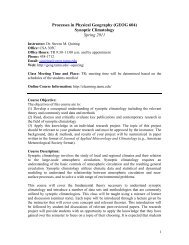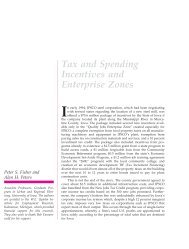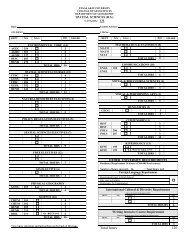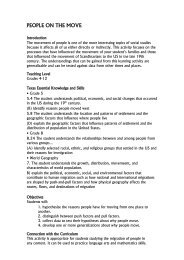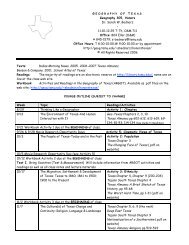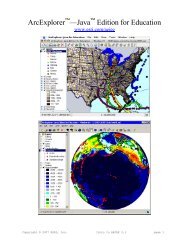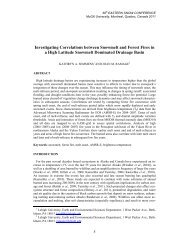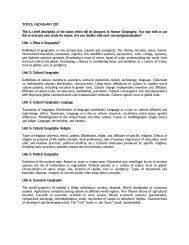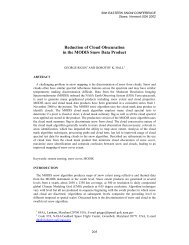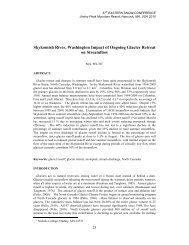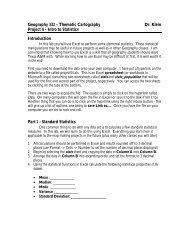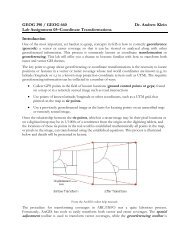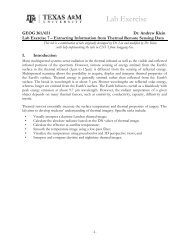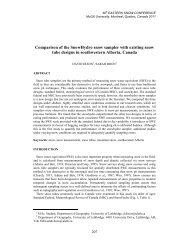Texas Social Studies Framework - Department of Geography ...
Texas Social Studies Framework - Department of Geography ...
Texas Social Studies Framework - Department of Geography ...
You also want an ePaper? Increase the reach of your titles
YUMPU automatically turns print PDFs into web optimized ePapers that Google loves.
Appendix A: How Should Districts Go about the Curriculum Development Task?<br />
district in <strong>Texas</strong>. Cutting corners on the resources<br />
necessary for curriculum development will limit possibilities<br />
for maximizing learning in the classroom.<br />
Identifying the Task Forces or Working Groups That<br />
Will Be Responsible for the Various Curriculum<br />
Development Tasks<br />
Careful consideration needs to be given to the composition<br />
<strong>of</strong> task forces and working groups responsible for<br />
the various curriculum development tasks. Generally<br />
such groups should represent a wide range <strong>of</strong> expertise<br />
and roles within the district. General suggestions for the<br />
composition <strong>of</strong> key groups are as follows:<br />
• The philosophy <strong>of</strong> social studies: curriculum<br />
specialists, central <strong>of</strong>fice administrators,<br />
principals, teachers, parents, and the public<br />
• Needs assessment, current status <strong>of</strong> the social<br />
studies curriculum, and changes necessitated by<br />
the TEKS for social studies and other forces:<br />
curriculum specialists, central <strong>of</strong>fice administrators,<br />
principals, teachers<br />
• General scope and sequence document: curriculum<br />
specialists, central <strong>of</strong>fice administrators,<br />
principals, teachers<br />
• Grade level or course documents: curriculum<br />
specialists, principals, teachers<br />
• Instructional unit documents: curriculum<br />
specialists, teachers<br />
Setting Standards for Quality Control, Process<br />
Monitoring, and Review <strong>of</strong> the Curriculum<br />
In addition to choosing qualified individuals to serve on<br />
groups charged with particular curriculum development<br />
tasks, the leadership team is responsible for providing<br />
the groups with guidance, a time line for their work,<br />
specifications for the content <strong>of</strong> finished products,<br />
suggested formats, and other assistance as needed. In<br />
order to insure good communication between the<br />
leadership team and other work groups, one or more<br />
members <strong>of</strong> the leadership team should serve in a liaison<br />
capacity on each <strong>of</strong> the work groups.<br />
93<br />
93<br />
Making Plans for the Implementation <strong>of</strong> the Curriculum<br />
and the Accompanying Pr<strong>of</strong>essional Development<br />
That Will Be Necessary<br />
The implementation <strong>of</strong> curriculum means change and<br />
change nearly always encounters resistance from people<br />
who feel threatened by it. One <strong>Texas</strong> educator is fond <strong>of</strong><br />
saying, “The only person who likes change is a baby<br />
with a wet diaper.” If classroom educators and other<br />
concerned stakeholders are kept informed <strong>of</strong> the curriculum<br />
development/revision task as it is occurring, if they<br />
participate in the development <strong>of</strong> the curriculum, if they<br />
have had the opportunity to review the various draft<br />
documents and provide feedback, if the curriculum is<br />
presented in such a way that classroom educators can see<br />
how it will help them to be more effective, and if they are<br />
provided with the pr<strong>of</strong>essional development necessary to<br />
make them feel comfortable as they implement the new<br />
curriculum, little resistance to change will be encountered.<br />
If classroom educators are left uninformed, if they<br />
feel their concerns are not being heard, if changes seem<br />
to increase their workloads, or if they feel they are not<br />
prepared to deal with the changes, resistance to change<br />
will be strong and a low level <strong>of</strong> implementation can be<br />
expected.<br />
Establishing the Means for Monitoring Curriculum<br />
Implementation and Ongoing Evaluation <strong>of</strong> the<br />
Curriculum<br />
The job <strong>of</strong> the curriculum leadership team is not over<br />
once curriculum materials have been presented to<br />
classroom educators. It is the responsibility <strong>of</strong> the team<br />
to monitor the implementation <strong>of</strong> the social studies<br />
curriculum, determining whether teachers are using the<br />
grade level or course guide documents, whether they<br />
understand the documents, whether the necessary<br />
resources are available, and whether students seem to be<br />
engaged and learning. An additional concern <strong>of</strong> the<br />
leadership team should involve the collection <strong>of</strong> data<br />
revealing how well the curriculum documents are<br />
meeting expectations: are they clear, are they accurate,<br />
are they comprehensive, are they teacher friendly, are<br />
students meeting expectations. Regular communication<br />
with classroom educators will reveal that even with the<br />
best <strong>of</strong> planning, the new curriculum has shortcomings<br />
and will need to be revised to make it more effective.



